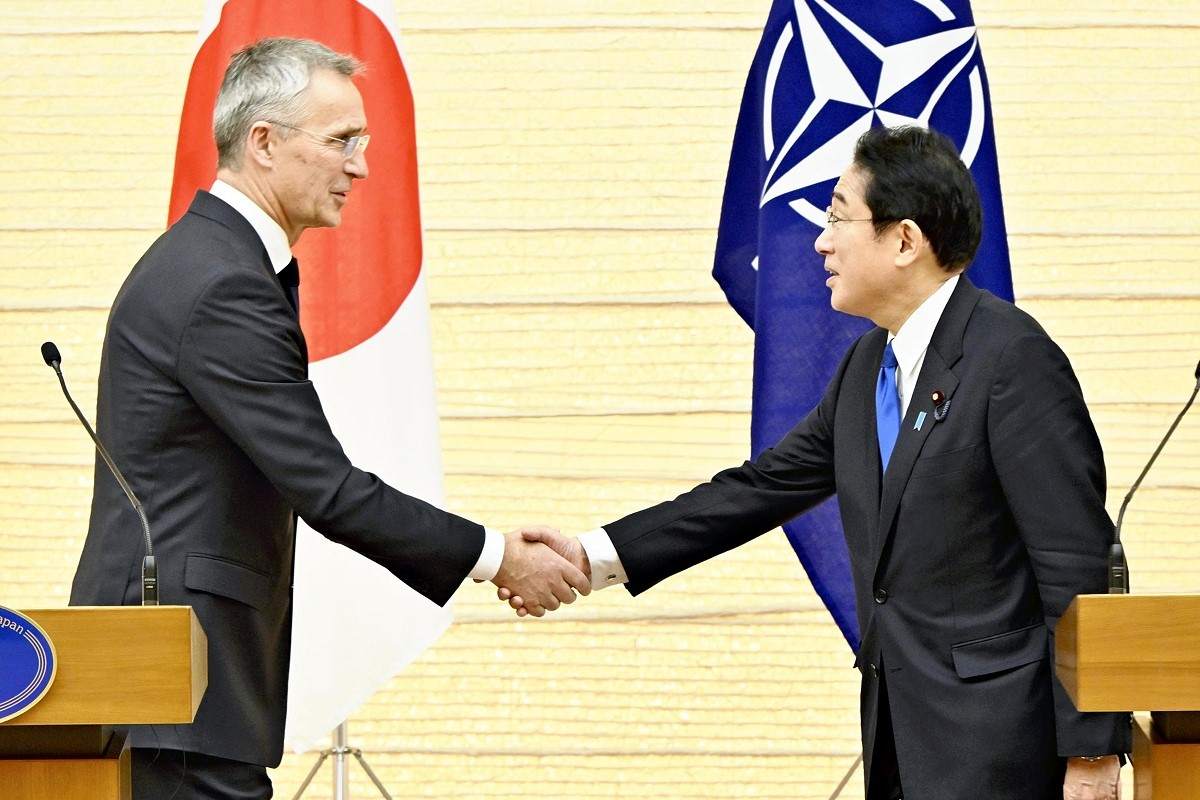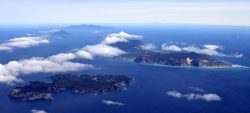
Prime Minister Fumio Kishida shakes hands with NATO Secretary General Jens Stoltenberg following their joint press announcement at the Prime Minister’s Office on Tuesday afternoon.
2:00 JST, February 2, 2023
The deepening of security cooperation between Japan and NATO, driven by a shared understanding of the need to counter China and Russia, was spelled out by Prime Minister Fumio Kishida and North Atlantic Treaty Organization Secretary General Jens Stoltenberg when they met in Tokyo on Tuesday.
Japan and NATO aim to build a broad network of partnerships based on shared values.
***
Criticizing China by name
“I welcome NATO’s deepening interest and involvement in the Indo-Pacific region,” Kishida said at a joint press announcement with Stoltenberg after their talks at the Prime Minister’s Office.
What Kishida appeared to have in mind is a partnership to deter China’s increasingly hegemonic behavior. Seeming to underline Kishida’s intention, Stoltenberg referred to China by name, saying that it is “bullying its neighbors, and threatening Taiwan,” and emphasized the need for NATO and Japan to work together to address the challenge posed by China.
Kishida has made clear his emphasis on NATO. In Spain last June, he became the first Japanese prime minister to attend a NATO summit, where he emphasized that “the security of Europe and the Indo-Pacific region is inseparable.”
Last November, he invited NATO military officers as observers to “Keen Sword,” a joint exercise between the Self-Defense Forces and the U.S. military in the Nansei Islands and elsewhere.
With the Japan-U.S. alliance as its cornerstone in security, Japan is hurrying to deepen cooperation with NATO due to its growing sense of crisis over a possible Taiwan contingency.
Many security experts see a strong likelihood that China will move to absorb Taiwan by force by 2027. The Japan-NATO joint statement released after their talks clearly stated “the importance of peace and stability across the Taiwan Strait.”
In the event of Chinese military action against Taiwan, Japan would be near or even on the front line. A Chinese military attack on the Nansei Islands, which include Okinawa Prefecture, to contain a counterattack by U.S. forces based in Japan, cannot be ruled out. If the conflict becomes protracted, support from other countries in the form of arms and ammunition will become indispensable. Ukraine continues to resist Russia’s aggression thanks to support mainly from NATO.
A senior SDF official noted, “The U.S. forces will be at the front in a Taiwan contingency and cannot afford to provide material support to the SDF, making support from NATO extremely important.”
Established in 1949 to counter the threat from the Communist bloc led by the Soviet Union, NATO is a military alliance that now has 30 member states, including Canada, France, Germany, Poland, Turkey, the United Kingdom and the United States. Article 5 of the North Atlantic Treaty stipulates the mutual defense obligations of its member states.
Cognitive warfare
Japan also places its hope on the provision of knowledge from NATO to improve the SDF’s capabilities in such new areas as cognitive warfare. Cognitive warfare, in which false information is disseminated to manipulate and disturb the psychology of the general public in an adversary and bring about social disorder, has been deployed by Russia in its aggression against Ukraine and is also being studied within NATO.
China is also likely to make full use of cognitive warfare in the event of a contingency in Taiwan, making it imperative for Japan to improve its response capabilities.
Multilayered network
The biggest aim of deepening cooperation between Japan and NATO is to enhance deterrence to prevent a Taiwan contingency from happening in the first place. Japan and NATO, which share common values such as the rule of law, can serve as the foundation for a multilayered network to counter the rule of force that China and Russia envisage wielding.
On the sidelines of the NATO summit talks last June, Kishida called on the leaders of South Korea, Australia and New Zealand, who were also invited to the summit, to hold a four-party meeting for the first time. Under a framework called NATO’s four Asia-Pacific partners (AP4), meetings have continued among diplomats of the four nations.
Katsutoshi Kono, former chief of staff of the Joint Staff of SDF, explains: “Strengthening cooperation with NATO is expected to have a significant deterrent effect against China and North Korea. With NATO backing in addition to [the alliance of] Japan and the United States, the deterrent effect will be different against China, which is believed to be plotting a Taiwan contingency.”
Top Articles in Politics
-

Japan PM Takaichi’s Cabinet Resigns en Masse
-

Sanae Takaichi Elected Prime Minister of Japan; Keeps All Cabinet Appointees from Previous Term
-

Japan’s Govt to Submit Road Map for Growth Strategy in March, PM Takaichi to Announce in Upcoming Policy Speech
-

LDP Wins Historic Landslide Victory
-

LDP Wins Landslide Victory, Secures Single-party Majority; Ruling Coalition with JIP Poised to Secure Over 300 seats (UPDATE 1)
JN ACCESS RANKING
-

Producer Behind Pop Group XG Arrested for Cocaine Possession
-

Japan PM Takaichi’s Cabinet Resigns en Masse
-

Man Infected with Measles Reportedly Dined at Restaurant in Tokyo Station
-

Israeli Ambassador to Japan Speaks about Japan’s Role in the Reconstruction of Gaza
-

Videos Plagiarized, Reposted with False Subtitles Claiming ‘Ryukyu Belongs to China’; Anti-China False Information Also Posted in Japan


























